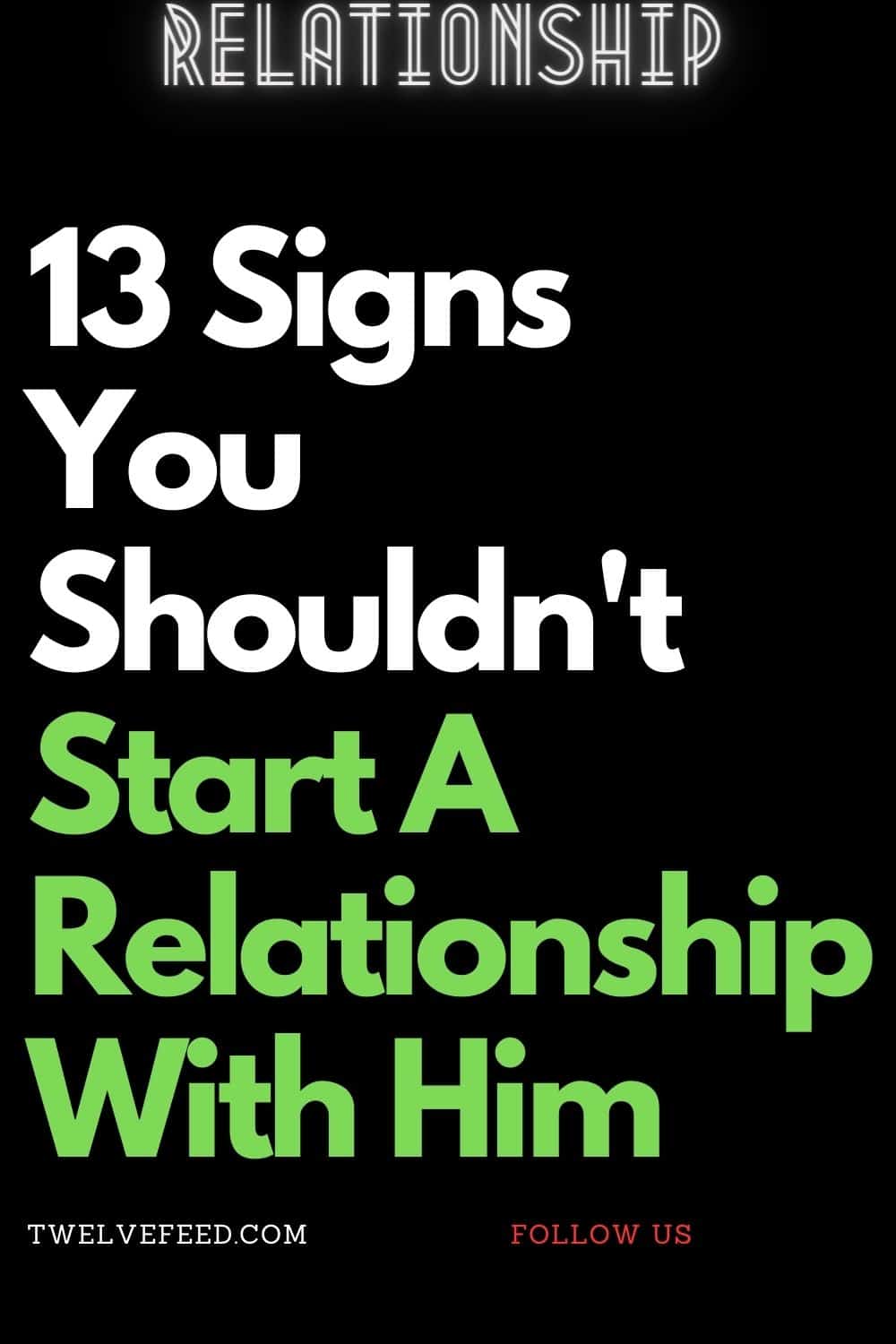
Are you considering starting a new relationship? It’s essential to be mindful of certain signs that may indicate a potential partner is not the right fit for you. Building a healthy and fulfilling relationship requires compatibility, trust, and effective communication. In this article, we will explore thirteen signs that suggest you shouldn’t start a relationship with him. Paying attention to these indicators can save you from heartbreak and disappointment down the road.
1. Lack of Compatibility
Compatibility forms the foundation of a successful relationship. If you find that you have little in common with the person you’re considering entering a relationship with, it may be a sign that you shouldn’t proceed. Shared interests, values, and lifestyles help foster a deep connection between partners.
2. Trust Issues
Trust is a crucial element in any relationship. If you notice red flags such as secrecy, constant doubt, or a history of infidelity, it may be wise to reconsider starting a relationship with him. Trust issues can create a toxic environment and hinder the growth of a healthy and long-lasting bond.
3. Communication Problems
Effective communication is vital for resolving conflicts, expressing emotions, and building intimacy. If you consistently struggle to communicate with the person, misunderstandings and frustrations may arise. Starting a relationship without open and honest communication can lead to misunderstandings and feelings of disconnect.
4. Frequent Arguments
Disagreements are a natural part of any relationship, but if arguments escalate into frequent and intense conflicts, it may be a sign that the relationship is not sustainable. Constant fighting can drain both partners emotionally and damage the relationship beyond repair.
5. Different Life Goals
Having shared aspirations and life goals is essential for long-term compatibility. If you and your potential partner have significantly different visions for the future, it may be challenging to build a harmonious and fulfilling life together. It’s important to evaluate whether your goals align before committing to a relationship.
6. Emotional Unavailability
Emotional availability is crucial for a healthy and intimate connection. If your potential partner struggles to express or acknowledge their emotions, it can create a significant barrier in the relationship. Emotional unavailability often leads to feelings of loneliness and dissatisfaction.
7. Controlling Behavior
Control and possessiveness are unhealthy traits in a relationship. If your potential partner displays controlling behavior, such as dictating who you can spend time with or isolating you from friends and family, it’s a clear warning sign. A healthy relationship should be based on trust and mutual respect, not control.
8. Lack of Respect
Respect is the cornerstone of a successful relationship. If your potential partner consistently disrespects you or disregards your boundaries, it’s a sign that they may not value your feelings or opinions. Starting a relationship without mutual respect can lead to emotional turmoil and dissatisfaction.
9. Incompatibility in Values
Shared values help strengthen the bond between partners and guide the direction of a relationship. If you and your potential partner have fundamentally different values, it can lead to constant conflicts and misunderstandings. Evaluating value alignment is crucial before embarking on a committed relationship.
10. Past Baggage
Past experiences can significantly impact present relationships. If your potential partner has unresolved issues or emotional baggage from previous relationships, it may negatively affect your connection. It’s important to assess whether they have taken steps to heal and grow from their past before starting a relationship.
11. Lack of Effort
A healthy relationship requires effort and commitment from both partners. If you notice a lack of effort or investment from the person you’re considering starting a relationship with, it may be an indication that they are not ready or willing to prioritize the relationship. A one-sided relationship is unlikely to thrive.
12. Intuition and Gut Feeling
Your intuition can provide valuable insights into whether a relationship is right for you. If you have a persistent gut feeling that something is not quite right or that the person may not be the right fit, it’s crucial to trust your instincts. Your intuition can guide you toward healthier relationship choices.
13. Conclusion
Starting a relationship is a significant decision that requires careful consideration. By paying attention to these thirteen signs, you can gain clarity on whether it’s the right time and the right person for you. Remember, a healthy and fulfilling relationship should be based on compatibility, trust, effective communication, and shared values. Listen to your intuition, prioritize your well-being, and choose a partner who enhances your life.
FAQs
Q: Can people change, or should I rely on these signs completely? A: People can change, but significant personal growth requires time and effort. It’s essential to prioritize your well-being and make decisions based on the present reality rather than potential future changes.
Q: What if I see some of these signs but still have strong feelings for the person? A: It’s natural to have strong feelings for someone even when warning signs are present. However, it’s important to balance emotions with rational thinking. Consider whether the signs indicate long-term incompatibility and evaluate the overall health of the relationship.
Q: How do I address these signs with my potential partner? A: Open and honest communication is key. Express your concerns calmly and constructively, allowing your potential partner to share their perspective. Remember, a willingness to address issues and work on the relationship is a positive sign.
Q: Is it possible for a relationship to overcome these signs? A: Every relationship is unique, and some challenges can be overcome with dedication and effort from both partners. However, it’s important to assess the severity of the signs and whether both individuals are committed to personal growth and positive change.
Q: How long should I wait before deciding if these signs are deal-breakers? A: There’s no set timeline for making such decisions. Take the time you need to gather information, observe patterns, and assess the overall compatibility and health of the relationship. Trust your instincts and make choices that align with your values and well-being.





